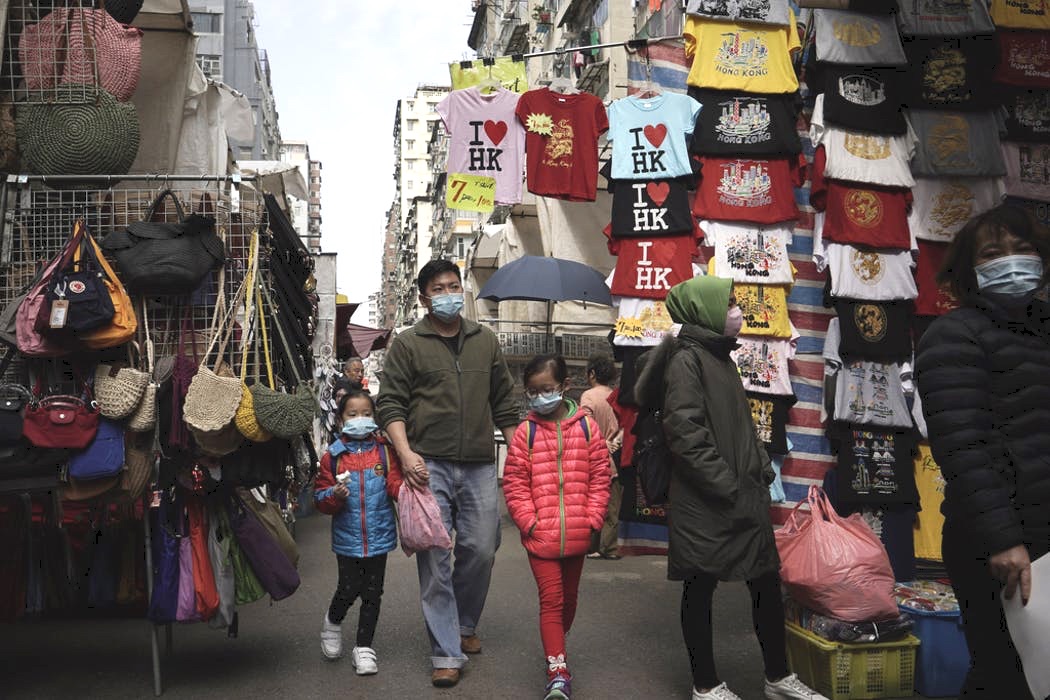The Yu Garden, a 16th-century complex of pavilions and ponds in the heart of Shanghai, was all gussied up for the Chinese New Year holiday. Its walkways were bedecked with colorful lanterns, its stalls laden with dumplings, its entrances flanked by dozens of security guards to handle crowds.
Just one thing is missing: people. Fearful of coronavirus, they stayed home.
“I’ll be doing well if I make a few sales today,” says Li Xinming, manager of a silk-scarf shop. Last year Yu Garden attracted 700,000 visitors during the holiday week, peak season for it and its merchants. This year, Li said his losses might wipe out his earnings for months to come.
The question for China, and for the many companies and countries around the world linked to its economy, is whether Li’s travails are indicative of a much broader problem.
The obvious reference point is China’s battle with SARS, another coronavirus, in 2003. Growth slowed sharply at the height of the epidemic but rebounded swiftly after it was contained. Other recent epidemics have reinforced the impression that economists should not be overly worried, so long as good doctors are on the job. Neither avian flu in 2006 nor swine flu in 2009 dimmed the global outlook.
Yet even flint-hearted investors are wondering whether the new epidemic might be worse. Stocks in Hong Kong have fallen by nearly 10% as reported infections have steadily increased. Tremors have also rippled through global markets.
The concern is less the severity of the virus, which seems less lethal than SARS, but rather the nature and potential duration of China’s efforts to bring the outbreak under control. And disruption in China, the world’s second-biggest economy, has global consequences. “It’s not the disease, it’s the treatment,” wrote analysts with Gavekal Dragonomics, a consultancy.
The World Bank has estimated that as much as 90% of the economic damage from epidemics stems from people’s fear of associating with others, which leads offices and stores to close. In China, this is being magnified by the government’s policy of isolating affected areas and limiting interpersonal contact throughout the country. While public-health experts debate whether this is the right approach, economists will count the costs.
The most direct effect is being felt in Hubei province. First Wuhan, its capital, was placed under quarantine. Then the rest of the province, home to nearly 60 million people, was locked down, too. Apart from food trucks and medical supplies, little can enter its cities and villages, and few are permitted to leave. Such a large-scale isolation is unprecedented as a public-health strategy. Economic activity of just about any kind, short of hospital care and movie streaming, has ground to a halt. Hubei generates 4.5% of China’s GDP, so the closure will leave a hole.
Other cities in China may not be under quarantine but that is what life feels like for their residents. Instead of getting together with family and friends, attending temple fairs and going to restaurants — all, depending on where one lives, staples of the holiday — people have shut themselves in. The government has encouraged them to avoid crowds; many need little prodding.
That will be a drag on consumption. The extent of the damage will depend on how long it takes to stop the virus, but the timing is already rotten. Last year retail sales exceeded 1 trillion ($144 billion) yuan during the new-year week, a third more than an average week. This year, sales are sure to fall well short of that.
Some industries are being hit especially hard. The holiday accounted for 9% of China’s box-office revenue last year. This year almost all of the country’s 11,000 cinemas are closed. Spending on domestic tourism during the new-year week reached more than 500 billion yuan last year, about 8% of the annual total. This year, fearful of the virus, people have canceled trips.
There are also worries about how the virus will affect factories and offices. Several major economic centers, including Shanghai and Guangdong province, have extended the New Year holiday by a week, telling companies to wait until Feb. 10 to restart. Chinese businesses are always slow to get back up to speed after the holiday.
The extra week will make them slower, even if some firms such as Tencent, a tech giant, let employees work from home. Moreover, tens of millions of migrant workers, back in their hometowns for the holiday, may wait for the epidemic to recede before crowding onto trains and buses to return to their jobs.
One critical difference compared with SARS is China’s importance for the rest of the world. In 2003, China generated 4% of global GDP. Last year, it was 16%.
The slowdown in consumption and the disruption to production will not stop at its borders.



 RSS Feed
RSS Feed